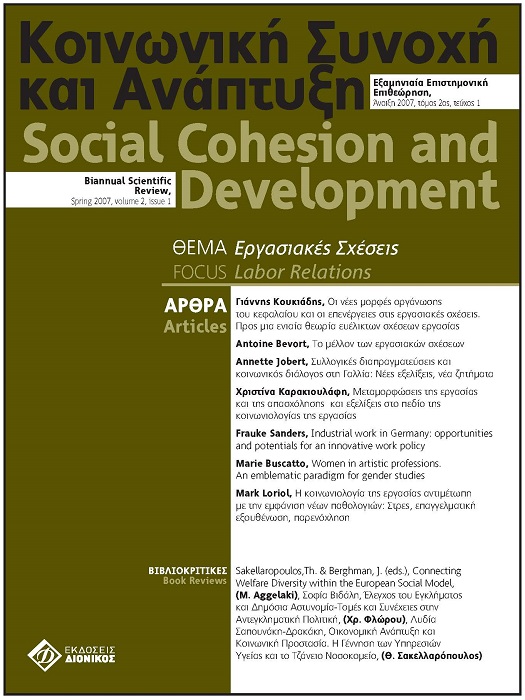Το μέλλον των εργασιακών σχέσεων
Abstract
Το τέλος της κεϋνσιανής σκέψης και η έλευση των φιλελεύθερων πολιτικών που προκάλεσε η παγκοσμιοποίηση, τα νέα μοντέλα του μάνατζμεντ και οι συνεχείς τεχνολογικές αλλαγές, έχουν περιορίσει τον ρόλο των κρατικών ρυθμίσεων και έχουν ενισχύσει την ευελιξία των συνθηκών εργασίας. Λόγω του σημαντικού ρόλου του κράτους και της αδυναμίας των εργατικών συνδικάτων, η εξέλιξη αυτή είναι ίσως πιο βαθιά στο γαλλικό «κρατικό-φορντικό» (state-fordist) σύστημα των εργασιακών σχέσεων. Με βάση κυρίως την εμπειρία των εργασιακών σχέσεων στη Γαλλία, το παρόν άρθρο αποπειράται να σκιαγραφήσει το μέλλον των εργασιακών σχέσεων, πέρα από τις τρέχουσες αλλαγές, προτείνοντας δύο πιθανά σενάρια. Το ένα είναι η εκδοχή του «κράτους-αγορά» (state market) και το δεύτερο είναι το δημοκρατικό σενάριο. Αν και η επιχειρηματολογία του συγγραφέα ευνοεί το δεύτερο σενάριο, το άρθρο διαπιστώνει ότι το πρώτο σενάριο φαίνεται να επιβεβαιώνεται περισσότερο από τις σύγχρονες εξελίξεις.
Article Details
- Zitationsvorschlag
-
Bevort, A. (2016). Το μέλλον των εργασιακών σχέσεων. Social Cohesion and Development, 2(1), 21–32. https://doi.org/10.12681/scad.9036
- Rubrik
- Articles

Dieses Werk steht unter der Lizenz Creative Commons Namensnennung - Nicht-kommerziell - Weitergabe unter gleichen Bedingungen 4.0 International.
Authors who publish with this journal agree to the following terms:
- Authors retain copyright and grant the journal right of first publication with the work simultaneously licensed under a Creative Commons Attribution Non-Commercial License that allows others to share the work with an acknowledgement of the work's authorship and initial publication in this journal.
- Authors are able to enter into separate, additional contractual arrangements for the non-exclusive distribution of the journal's published version of the work (e.g. post it to an institutional repository or publish it in a book), with an acknowledgement of its initial publication in this journal.
- Authors are permitted and encouraged to post their work online (preferably in institutional repositories or on their website) prior to and during the submission process, as it can lead to productive exchanges, as well as earlier and greater citation of published work (See The Effect of Open Access).
Downloads
Keine Nutzungsdaten vorhanden.



